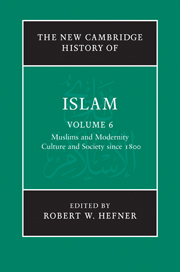Book contents
- Frontmatter
- 1 Introduction: Muslims and modernity: culture and society in an age of contest and plurality
- PART I SOCIAL TRANSFORMATIONS
- PART II RELIGION AND LAW
- PART III POLITICAL AND ECONOMIC THOUGHT
- PART IV CULTURES, ARTS AND LEARNING
- 20 Islamic knowledge and education in the modern age
- 21 History, heritage and modernity: cities in the Muslim world between destruction and reconstruction
- 22 Islamic philosophy and science
- 23 The press and publishing
- 24 The modern art of the Middle East
- 25 Cinema and television in the Arab world
- 26 Electronic media and new Muslim publics
- Glossary
- Bibliography
- Index
- References
22 - Islamic philosophy and science
from PART IV - CULTURES, ARTS AND LEARNING
Published online by Cambridge University Press: 28 March 2011
- Frontmatter
- 1 Introduction: Muslims and modernity: culture and society in an age of contest and plurality
- PART I SOCIAL TRANSFORMATIONS
- PART II RELIGION AND LAW
- PART III POLITICAL AND ECONOMIC THOUGHT
- PART IV CULTURES, ARTS AND LEARNING
- 20 Islamic knowledge and education in the modern age
- 21 History, heritage and modernity: cities in the Muslim world between destruction and reconstruction
- 22 Islamic philosophy and science
- 23 The press and publishing
- 24 The modern art of the Middle East
- 25 Cinema and television in the Arab world
- 26 Electronic media and new Muslim publics
- Glossary
- Bibliography
- Index
- References
Summary
Many speak of the ‘impact of the West’ – not of technicalism – on Islamdom, as if it were two societies, not two ages that met; as if it were that Western progress had finally reached the point where Muslims could no longer escape it, rather than that something new had happened to Western culture which thereby was happening to Islamdom and the whole world as well.
At the present juncture of our standard scholarship, and given our high-pitched cultural and methodological attitudes that still radiate resiliently from Enlightenment constructs, it is only with a good deal of nervousness that one attempts to present an overview of Islamic philosophy and science in the modern period, especially since 1800. As a matter of scholarly integrity, then, one ought to declare at the very outset that any such overview, written as it is within a hundred years from the First World War, has to be rather precarious and must be considered tentative, far from offering a complete picture; an overview that is perhaps lopsided, one that is open to all kinds of revisions, adjustments and even reversals.
- Type
- Chapter
- Information
- The New Cambridge History of Islam , pp. 549 - 571Publisher: Cambridge University PressPrint publication year: 2010

